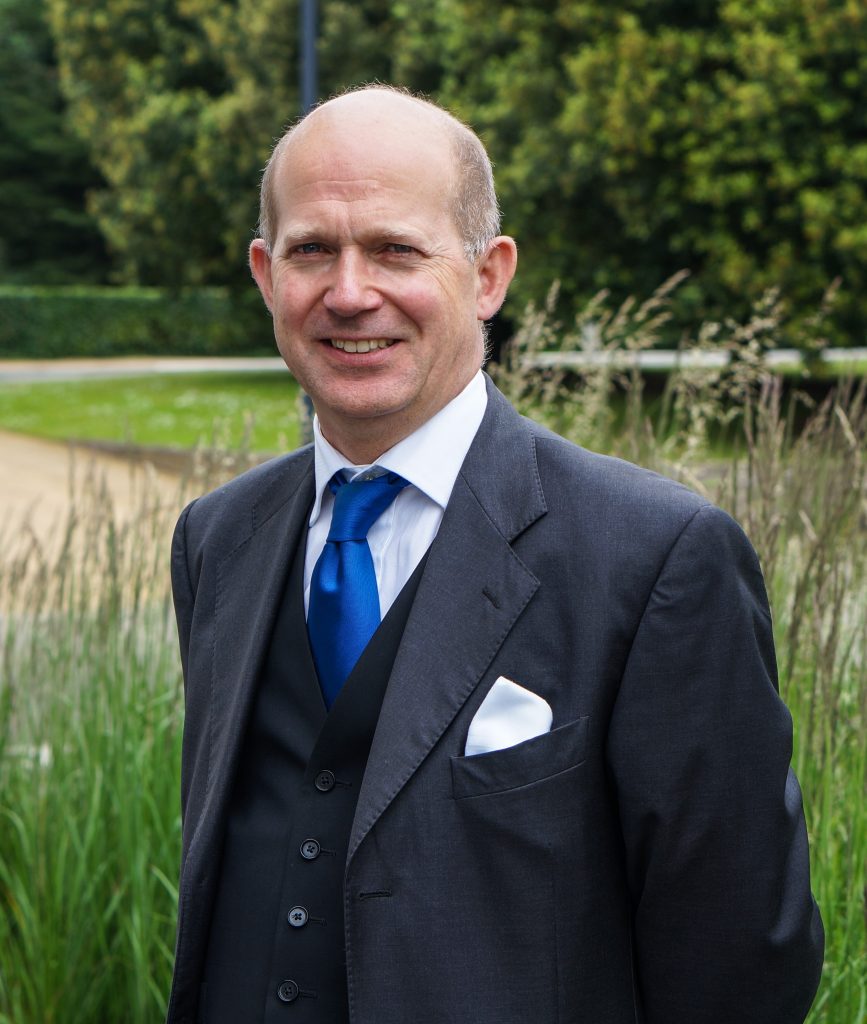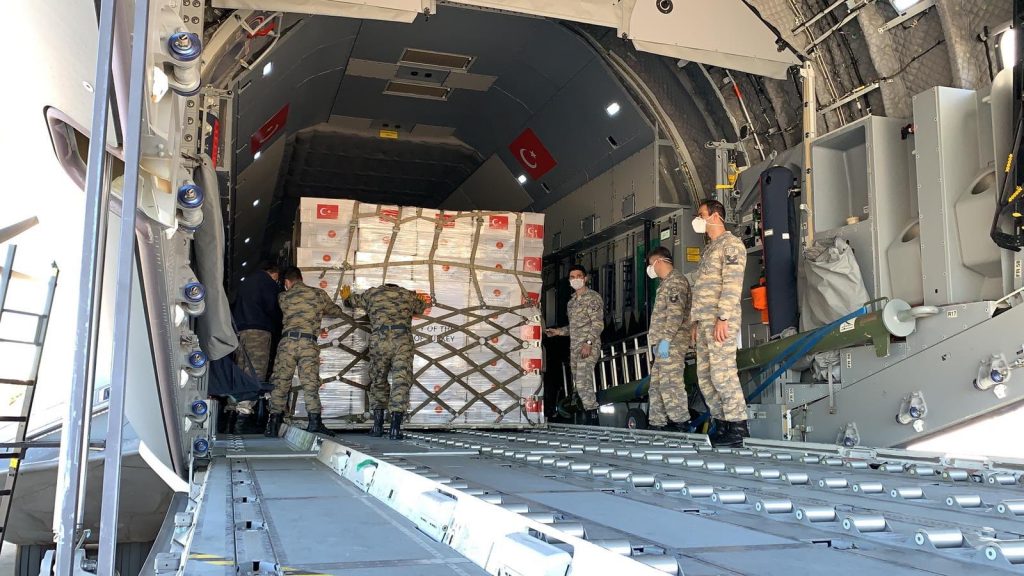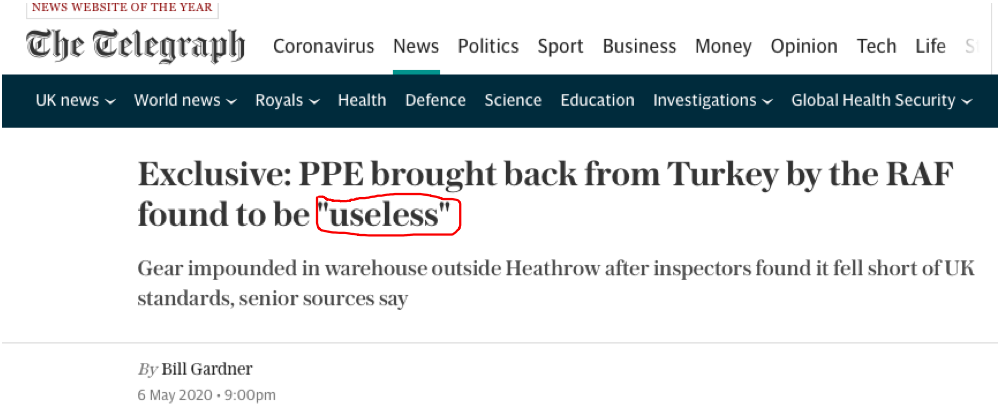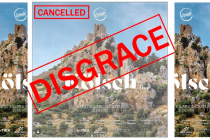British and Turkish officials have refuted British media reports that personal protection equipment (PPE) from Turkey has fallen short of required standards.
On Thursday evening, Britain’s envoy to Ankara Sir Dominick Chilcott took to Twitter to say, “Stories in the UK media that 400K items of PPE sent from Turkey are unusable are untrue.”
The UK’s Department of Health also said on Thursday, “While a small number of these gowns have failed tests in the UK, more have passed tests making them suitable for use in the NHS.”
Earlier in the day, however, British officials had fed the frenzy of negative news stories about medical gowns made in Turkey, by telling reporters that inspectors had found the supplies were ‘not suitable for use’ because of their poor quality.
Brandon Lewis, the Northern Ireland Secretary, told Sky News that the gowns were “not good enough” for frontline staff, suggesting that all 400,000 items of PPE bought from a commercial supplier in Turkey were being binned.
Mr Lewis said the government had “believed this equipment [from Turkey] was going to be of the right standard”, adding that, “When it’s been tested here in the UK, our experts have decided that it isn’t, and therefore it’s right we don’t use it for our frontline staff.”
How the British media ended up making false claims about Turkish PPE
The claims originated in The Telegraph, which first broke the story about Turkish-made PPE ‘failing tests’ on Wednesday evening.
Published online, the story ran with the title, ‘Exclusive: PPE brought back from Turkey by the RAF found to be “useless”’. The article, penned by the paper’s Deputy News Editor Bill Gardner, said, “the mission had ended in disaster”.

Citing “senior [government] sources”, The Telegraph claimed, wrongly it turns out, that “Thousands of gowns brought back from Turkey last month has been impounded in a warehouse outside Heathrow Airport after inspectors found the gear was “useless” and fell short of UK standards.”
They also quoted Mark Roscrow, the chairman of the Health Care Supplies Association, which represents NHS procurement teams, who said that the Turkey shipment had “clearly fallen short” and questioned why “Government officials had failed to carry out proper checks before spending taxpayers’ money.”
“Something very wrong has happened here,” he told The Telegraph.
Multiple British media took their cue from the right-wing broadsheet to smear Turkish PPE. The Daily Mail, Guardian, and The Sun all used “useless” in their story headlines.
While more restrained in their language, The Times, BBC and ITV also joined in, and the story went global. Everywhere you looked, there was an article repeating claims that the PPE privately sourced from Turkey – though few even made that distinction – was “not fit for use.”
Several, such as the Guardian, agitated still further by claiming that a “Downing Street” spokesperson had apparently confirmed “the NHS was now in negotiations to get new gowns sent, or it would ask for a refund from the supplier.”
It appeared few journalists had actually taken the time to even talk to the Turkish supplier, Selegna Tekstil in Istanbul. The firm appears to be new to producing garments for medical use, however a spokesperson said they’d not had any complaints from the NHS.
Speaking on behalf of Selegna, Mehmet Düzen told BBC Turkish that, “The fabric we supplied was certified. All the goods we used were certified”, adding that they were “ready to respond if there was a mistake.”
UK government expects high quality medical gowns while paying 75p for each
In a follow-up article in The Telegraph (‘Revealed: How an email from a Turkish T-shirt salesman led to a PPE fiasco, 7 May), Bill Gardner wrote:
“It is not known exactly how much the UK has already paid, but the total order is thought to be in the region of £300,000.”
While the bulk of the article focuses on how the UK’s procurement arm had failed to do its due diligence in checking the capabilities of the newly formed Selegna Tekstil, the journalist attached little significance to the actual cost the government was prepared to pay for the order.
“It’s impossible to make the gowns here [in the UK] for those sorts of prices”
If indeed the total value of 400,000 medical gowns was £300,000, this would equate to a mere 75 pence for each gown.
Bizarrely, The Telegraph did not see it fit to query why the UK government was expecting to purchase high quality medical gowns at such low costs.

One UK based textile manufacturer told T-VINE, “It’s impossible to make the gowns here [in the UK] for those sorts of prices.”
They also queried the UK expecting top standards for the price they paid for the gowns, stating that “If you pay this kind of money [75p per medical gown], you get that kind of quality.”
The Turkish-owned manufacturer, which asked not to be named, said they produce garments for a leading Italian-owned British brand, which is exported worldwide.
In recent weeks, the firm has joined a charitable initiative called EDN (Emergency Designer Network) set up by a group of British designers to make free scrubs for the NHS. Their factory, based in Greater London, received patterns and material from the charity, which they used to produce washable scrubs that have since been distributed by EDN to local hospitals.
They added, as a “small company with bills to pay”, they could “not afford to work for free”, but still wanted to donate scrubs to the NHS, because they “believe at this moment of crisis our small act might save a few lives.”
It took until Thursday evening before anyone in authority countered the British media narrative
On Thursday, the Turkish Health Ministry issued a statement aiming to rectify the misinformation in the British press, by reiterating that all PPE supplied by Turkey adhered to international standards:
“The CE and ISO certificates for all items donated by the Republic of Turkey and others supplied since were previously submitted to the British side. All of these products were sent to the UK after the National Health Service (NHS), which is responsible for the administration and coordination of the [UK’s] public health system, gave its approval.”
It took until Thursday evening, however, before British officials countered the British media narrative about the faulty gowns.
Stories in the UK media that 400K items of PPE sent from Turkey are unusable are untrue. A small number of gowns from a private supplier have failed tests. But more gowns from that supplier have passed tests and are suitable for use in the NHS.
— Dominick Chilcott (@DChilcottFCO) May 7, 2020
Tweeting in English and Turkish, the British ambassador to Ankara Sir Dominick Chilcott said:
“Stories in the UK media that 400K items of PPE sent from Turkey are unusable are untrue. A small number of gowns from a private supplier have failed tests. But more gowns from that supplier have passed tests and are suitable for use in the NHS.”
“The #UK government remains very grateful to the #Turkish government for its support of the UK’s requirements for PPE,” he added.
Writing in Turkish on Twitter on Thursday, the Fahrettin Altun, the communications director for the Turkish President, slammed the “anti-Turkish news.
Türkiye karşıtı her habere doğruluğunu ve güvenilirliğini hiç araştırmadan sahip çıkan bu zihniyet bizlere bağımsız, tarafsız, güvenilir ve sorumlu bir medyanın ne denli önemli olduğunu bir kez daha göstermiştir.
— Fahrettin Altun (@fahrettinaltun) May 7, 2020
He tweeted, “both UK and Turkish officials had refuted the baseless allegations and revealed the truth about the medical supplies issue.”
Mr Altun also called out, “the mentality of those who treated as true all anti-Turkey news without verifying its accuracy and reliability,” adding that this underlined “the importance of independent, impartial, credible and responsible media.”
Why has it taken you/the UK govt all day to issue a statement about this? In the meantime, the UK press have *again* unfairly attacked and vilified Turkey 😠. It’s appalling on every level. The UK has completely lost the art of diplomacy
— Prickly Pear (@pricklypearldn) May 7, 2020
Social media users also slammed the UK government for its late response. One asked the British ambassador:
“Why has it taken you/the UK govt all day to issue a statement about this? In the meantime, the UK press have *again* unfairly attacked and vilified Turkey [angry face emoji]. It’s appalling on every level. The UK has completely lost the art of diplomacy.”
Main picture, above, of PPE donated by the Turkish government to Britain on 10 April 2020. Photo from Twitter/Dominick Chilcott






